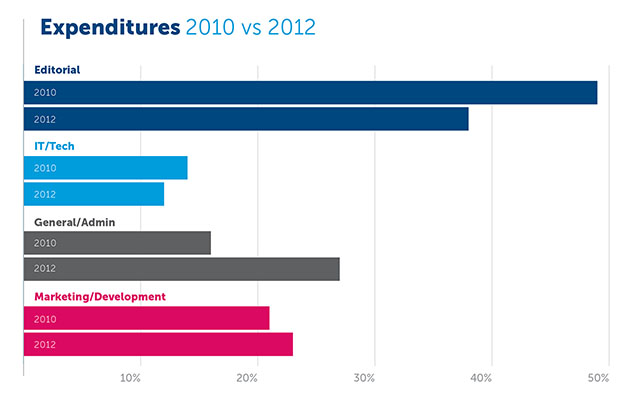
The Texas two-step: Journalism and events form a successful partnership at the Tribune
Photo credit: Flickr user The Texas Tribune.
At The Texas Tribune, events represent a successful marriage of mission and money.
The nonprofit news site, which covers Texas state politics and policy, is an events powerhouse. Trib events, which focus on state affairs, help the organization raise about one-fifth of its annual revenue and engage thousands of people in state affairs.
The Tribune is one of 18 nonprofit news startups that were part of a new Knight Foundation study, “Finding a Foothold: How Nonprofit News Ventures Seek Sustainability.” Fifteen of the organizations in the study stage events as a means of community engagement but only four, including the Tribune, reported significant revenue from them. (The others were NJSpotlight, the St. Louis Beacon and MinnPost.)
RELATED REPORT
The full data for Texas Tribune is also available online
The Tribune’s signature event is the annual Texas Tribune Festival, or Tribfest, a weekend of debate and discussion (dubbed “Woodstock for Wonks”) with more than 100 speakers and 40 interactive events. Attendance runs as high as 3,000 people, and the event nets nearly $400,000, said Evan Smith, the Trib’s editor-in-chief and CEO.
Other events include Tribune Conversations with prominent officials and newsmakers, which Smith moderates; The Hot Seat, a statewide series of events featuring local legislators and hosted by local universities; and one-day symposiums that feature experts, newsmakers and Tribune journalists discussing an important issue of the day, such as health care.The Tribune staged 52 events in 2012, producing nearly $875,000 in revenue with expenses of just $220,000. Events generated 19 percent of total revenue in 2012, the third largest source after individual donations and content sponsorships.
About 80 percent of the event revenue came from sponsorships, with the remainder from ticket sales and foundation support. Smith said the Tribune expects to stage 60 to 70 events in 2013 and projects event revenue of more than $1 million, about one fifth of expected total revenue.
Maggie Gilburg, director of development, said Texas Tribune sponsorships range from $3,000 up to $175,000 for a suite of events.
But money is not the only benefit. Events also provide a point of connection for donors. Gilburg said 37 percent of the Tribune’s donors RSVP’d to attend an event in 2012. The events are a key part of the Tribune’s mission of engaging Texans in politics and public affairs, and they help raise its profile as a valuable source of news, information and knowledge.
Smith emphasized the “knowledge” part, saying the Tribune’s goal is to help Texans understand and take charge of their government. In particular, Smith wants to help citizens hold their representatives accountable in a state where redistricting heavily favors Republican legislators in safe seats.
“We are going to people in communities all over this state and we are saying, ‘We will be your way into this government of yours. We will give you the information that allows you to keep up, that demonstrates the stakes that you have in the outcomes of these fights,’” Smith said.
That underscores a key difference between traditional media and nonprofit news organizations launched in the digital age: The benefit to the public doesn’t end with producing content. Engagement is a core part of the mission.
Encouragingly, The Texas Tribune has found a way to further that mission and make money from it.
Michele McLellan, consultant to Knight Foundation
Below: The Texas Tribune’s Expenditures 2010 vs. 2012
Recent Content
-
Journalismarticle ·
-
Journalismarticle ·
-
Journalismarticle ·




